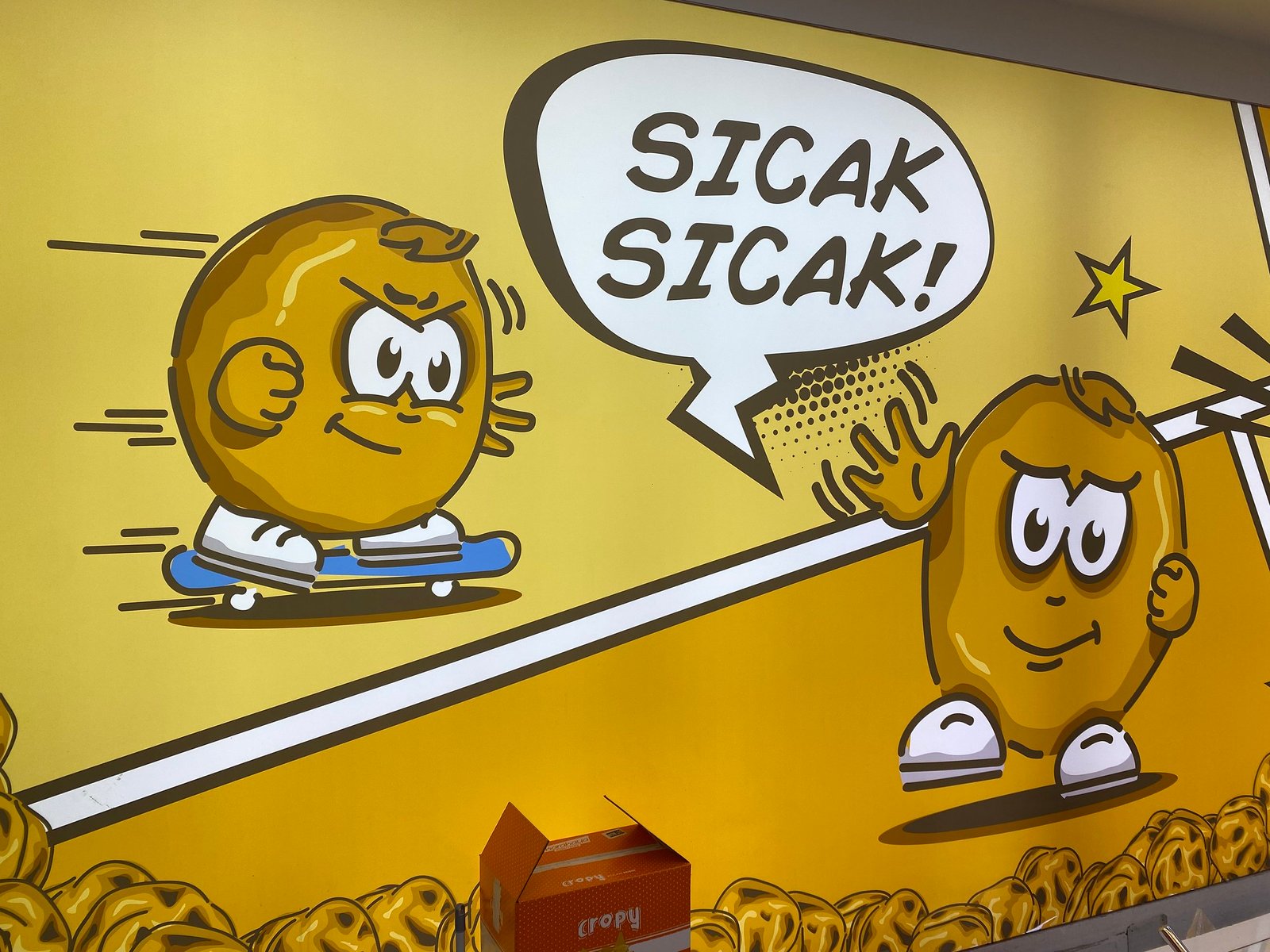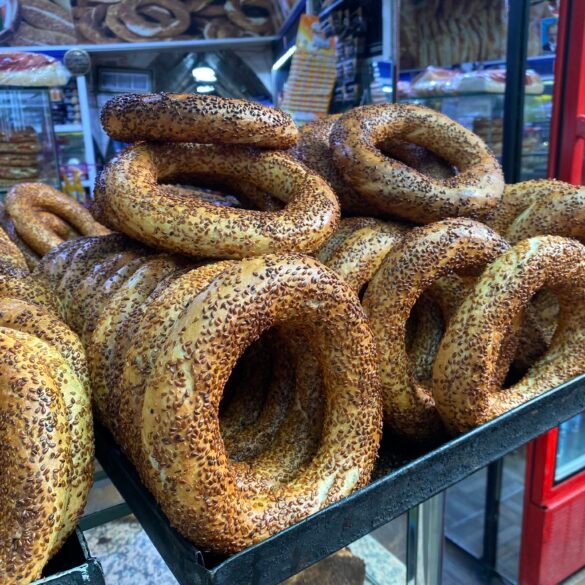In the evening of Day 6 in Türkiye, we were driving from Pamukkale down to Fethiye, after having spent the whole day exploring what Turkish people consider to be the 8th Wonder of the World. There’ll be a separate post about that later with some of the most surreal photographs I have ever taken. But for now, the story starts in the first half of a three-hour drive, late in the evening, after a long and thrilling day.
“What’s leblebi?” I asked Victor, as we drove down the main road through another small town, the shining lights of store facades reflecting off our car windows. Victor has been memorizing Turkish words for several days now, never failing to amaze me by randomly translating signs and menu items.
“I don’t know,” Victor said, “Why?”
“Every store sign in this town says Leblebi…” I said, “There, there’s another one! Leblebi Dunyasi!”
“Name of the town, probably,” Victor said.
I pulled out my phone and looked at Google Maps. The name of this town was Serinhisar.
There was a bit of traffic ahead of us, and Victor slowed down the car. There was a strange statue on the road median, two large hands pouring small round balls from one hand into the other.
“Maybe that’s leblebi!” Victor joked.
“It is! It is leblebi!” I yelled while staring at my phone, “I googled it! Leblebi are roasted chickpeas and are a very popular Turkish snack.”
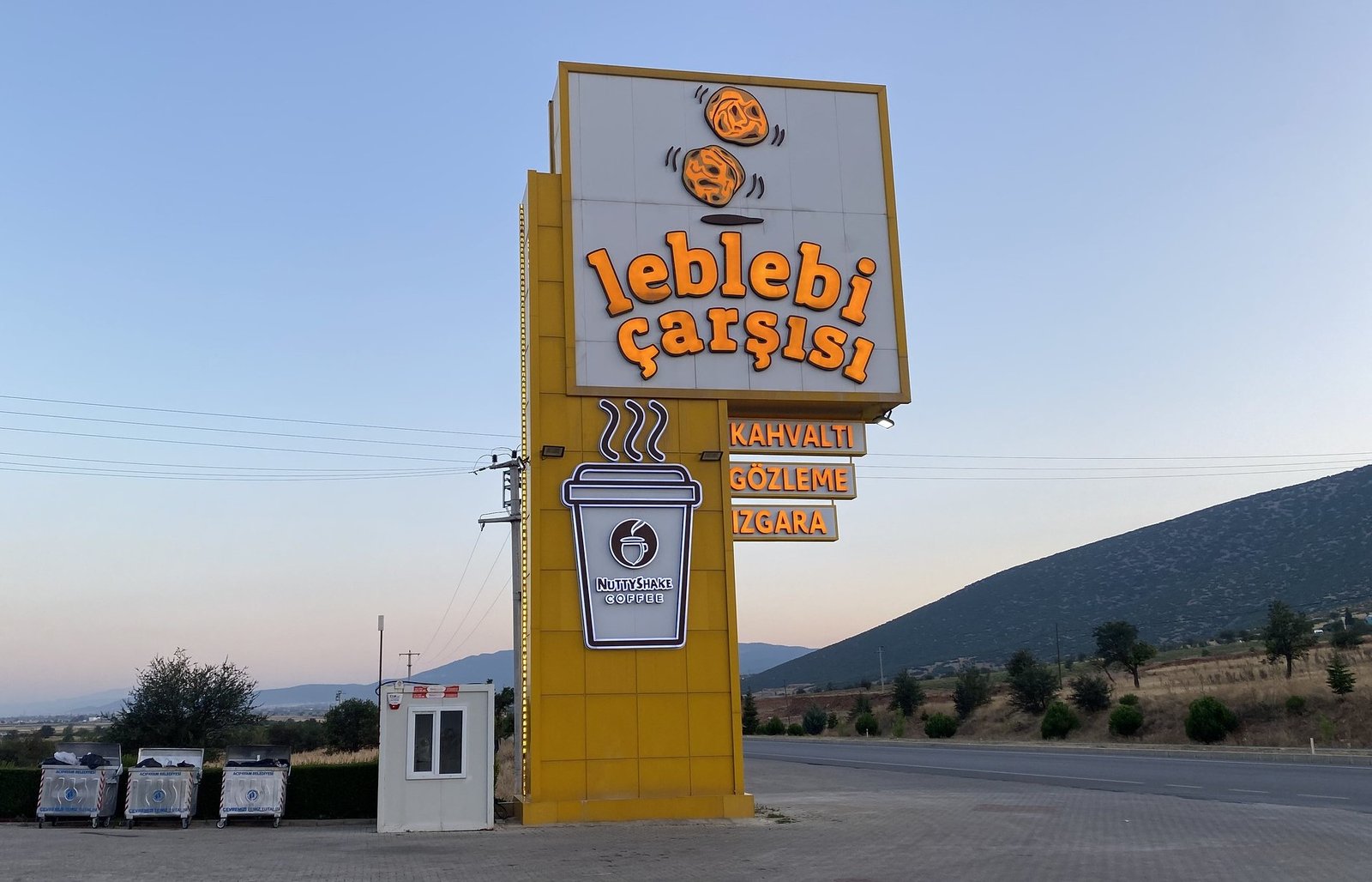
The Wikipedia entry for the town of Serinhisar was less than 50 words, and half of them were “Today Serinhisar is known for its leblebi (roasted chickpeas), pottery, ropemaking, and shoemaking. This is a rural area, and its people are hospitable and warmblooded.” I followed a link to a Wiki entry for leblebi and learned that these roasted chickpeas were an integral part of the traditional tastes of the Ottoman-Turkish food culture and were produced initially in Anatolia in the 17th century.
We kept driving, leblebi stores crowding the road on both sides. Not a single mention of pottery, ropemaking, or shoemaking, by the way. We were having a lively discussion about how and why this random town has so many gigantic chickpea stores when Victor pointed out another one, “Look, Leblebi Carsisi!”
“Oh, that’s the last one!” I said, looking at the map, “All the rest are behind us, and this is the very edge of town. No more leblebi.”
Victor frowned and glanced in the rear-view mirror. The road in front of us was descending into darkness, and the town in the mirror was slowly fading away into the distance.
“No,” said Victor furiously and threw the car into a U-turn, “We are getting leblebi!”
I could not stop laughing. Ten minutes ago, we didn’t know what leblebi was, and here we were, breaking traffic laws to get our hands on some. Before we walked in, I expected Leblebi Carsisi to be a regular grocery store with maybe a single aisle dedicated to this popular snack, but I was quickly proven wrong. It was wall-to-wall chickpeas. It’s hard to describe what we were looking at without providing some photographs. The whole store had an “edible gifts” vibe and was 70% leblebi, 20% Turkish delights, and the rest random and unexpected stuff like pistachio butter, chocolates shaped like river rocks, and sticky toffee caramel that almost pulled out a dental filling when I tried to eat it.
I immediately grabbed a shopping basket. There was no way we would leave here without filling it to the brim. There were gift boxes, bags, and giant bulk bins of leblebi everywhere. I walked along a giant display case, eyeing small round balls coated with different flavors, unsure which I wanted to buy. The attendant, in broken English, explained that everything in bulk bins could be sampled. Game on! In the next twenty minutes, we sampled chocolate-dusted, sesame-covered, colorful vanilla candied, flavored with chili, honey, chicken, poppyseed, toffee, almond, blackberry, and pumpkin leblebi, along with a whole bunch of sweet and savory flavors we couldn’t identify. We packed the shopping basket full, avoiding anything chocolate-coated that might melt in the Antalya heat, and topped it off with a jar of pistachio butter that the cashier wholeheartedly recommended at the check-out.
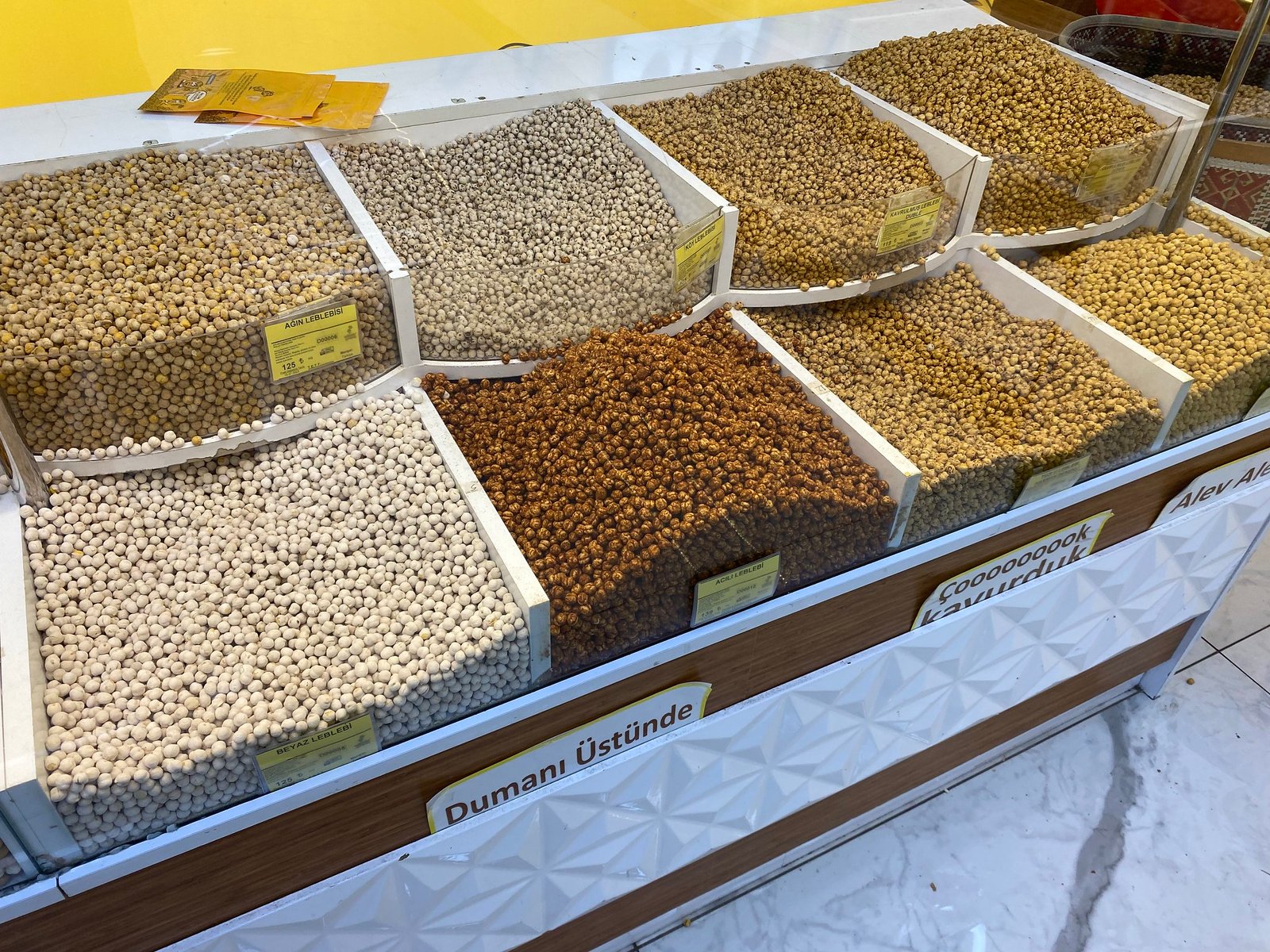
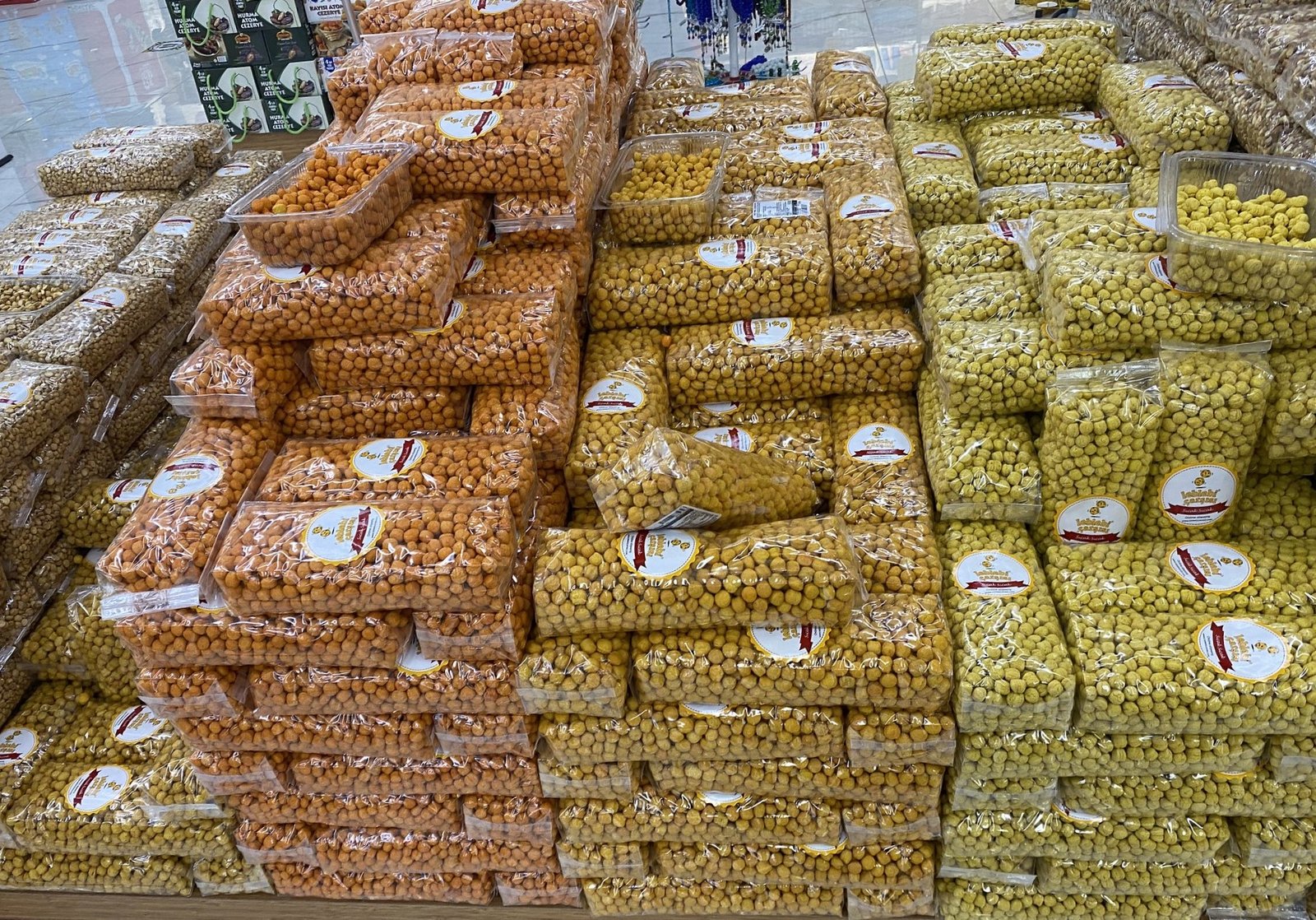
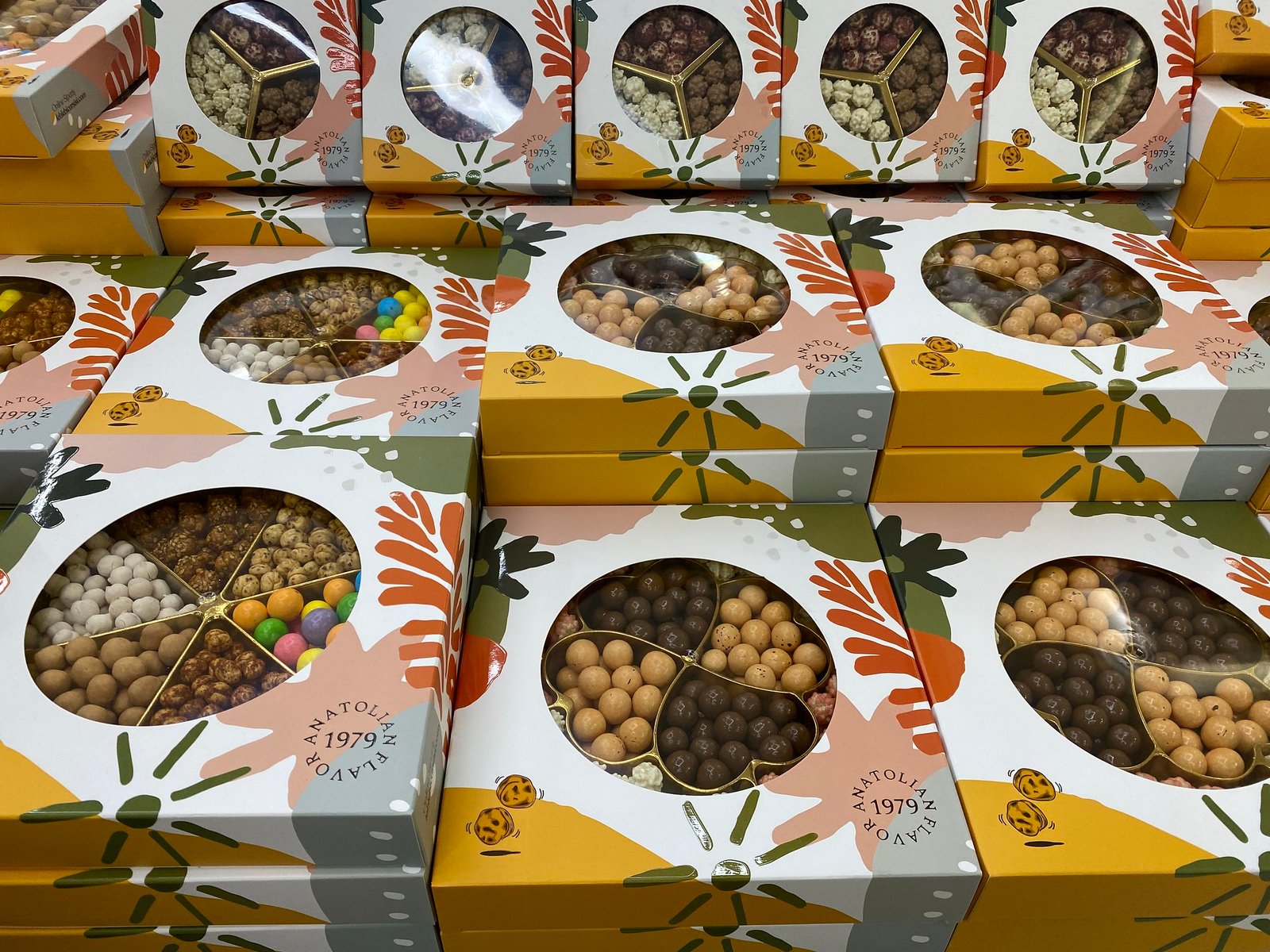
Continuing our drive, snacking on sweet yet spicy chili-flavored leblebi, we wondered if we had rushed into buying so much leblebi. If these were such a popular Turkish treat, certainly, we would see them everywhere! I decided to keep a lookout for a sighting of these crunchy chickpeas for the remainder of the trip.
The very next evening in Fethiye, I was in a small convenience store, standing in line behind five Russian men who were buying seven bottles of alcohol and one lemon, waiting my turn to purchase mineral water and fruit. Trying to distract myself from the loud conversation of whether seven bottles were enough for the evening, I started looking around the store and spotted a small display right by the door. It was one of those small clip strip racks, filled with small bags that I initially presumed were potato chips, but upon closer inspection revealed themselves to be filled with leblebi. Unlike other displays, this one was only labeled in Turkish, with no English or Russian translation, clearly meant for locals. And that is how it was in every store we saw, a small, unassuming leblebi display in no way arranged to catch the eye of a tourist. I would not have noticed leblebi unless I was specifically looking for it, and certainly would not have purchased it. Had we not driven down a road with dozens of leblebi shops vying for our attention (with an entire statue of leblebi in the middle of the town, on top of it), we would have never discovered this tasty snack.
We gifted leblebi to Victor’s parents once we met them in Antalya, ate them on the beach, and snacked on them in the airport on the way back. We gave out bags as gifts at home. And now, I only have one question left. Is it possible to buy leblebi in Chicago? And if so, where?
